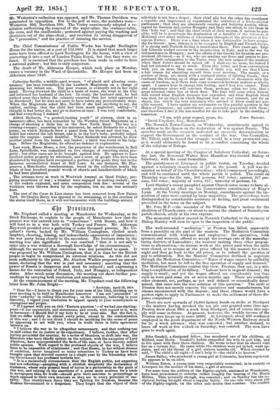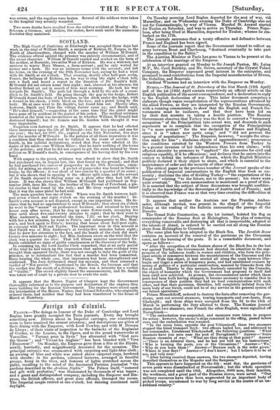i4t Vr ottiu rro.
Mr. Urquhart called a meeting at Manchester for Wednesday, at the Stock Exchange, to explain to the people of Manchester how that the present war was entered into in " connivance" with Russia, and how it will land us in a war both with Turkey and France. Mr. Alderman Heywood presided over a gathering of some thousand persons. Mr. Ur- quhart's views, backed by Mr. William Coningham, elicited much laughter, cheering, hissing, and indescribable expressions of impatience ; the war party being clearly in the ascendant. The business done by the meeting was also significant. It was resolved " that it is not safe to enter into a war without a thorough knowledge of its circumstances,"— although the mover of that resolution was not permitted to speak. It was proposed by Mr. William Coningham, that it is time for the British people to begin to comprehend its external relations. As this did not seem sufficiently to the point, Mr. Absolom Watkin proposed an amend- ment, declaring that the war is just and necessary ; asserting that the power of Russia is dangerous and must be reduced ; and expressing a desire for the restoration of Poland, Italy, and Hungary, as independent states. After much noisy discussion, the meeting cut short further pro- ceedings by carrying both resolution and amendment.
At the commencement of the meeting, Mr. Urquhart read the following letter from Mr. John Bright—
Rochdale, April 18, 1854. " Dear Sir—I have to thank you for your note of the 15th, inviting me to your meeting to be held in Manchester tomorrow. I am not 'astounded ' at your • audacity' in calling this meeting ; on the contrary, believing in your sincerity, I regard your resolution to appeal openly to your countrymen as courageous and proper.
" If I agreed with you on this 'Eastern question '—if we had one starting- point—if our arguments, and statements, and creeds, with regard to it, were in harmony—I should feel it my duty to be at your side. But the fact is, that we differ widely in almost every point, except in the condemnation of this war ; and I do not think I should do anything for the cause of peace by appearing to act with you, when in truth there is little agreement between us.
"I believe the war to be altogether unnecessary, and that nothing can be said either for its justice or its expediency. I believe, further, that after having permitted the country, by a series of blunders, to drift into war, the Ministers who have chiefly spoken on the subject, with the exception of Lord Aberdeen, have misrepresented the facts of the ease, or have thereby misled public opinion. With regard to the professed objects of the war, I believe them to be impossible of attainment ; and that Russia, in her wildest dreams of ambition, never imagined so many calamities to Turkey as have been brought upon that devoted country in a single year by the friendship which our Government has professed towards her. " It is a melancholy circumstance that' the English public, not expecting and not reflecting—accepting with a childish simplicity the declaration of statesmen, whose only present bond of nnion is a partnership in the guilt of this war, and relying on the assertions of a press more anxious for a trade in newspapers than for truth—should give their sanction to proceedings as ranch opposed to their own interests as they are to every principle of mo- rality. Our countrymen fancy they are fighting for freedom, because the Russian Government is a despotism. They forget that the object of their solicitude is not less a despot ; their chief ally but the other day overthrew a republic and imprisoned or expatriated the ministers of a freely-elected parliament ; that they are alternately coaxing and bullying Austria, whose regard for freedom and justice Hungary and Italy can attest, to join them in this holy war '; and that the chief result of their success, if success be pos- sible, will be to perpetuate the domination of a handful of the followers of Mehemet over many millions of Christians throughout the provinces of Eu- ropean Turkey. There was a time when it was fashionable to have sympa- thy for Greece ; now, Athens is to be occupied by English and French troops, if a strong anti-Turkish feeling is manifested there. Five years ago, Eng- lish Liberals wished success to the insurrection in Italy, and to the war for independence in Hungary; now the efforts of the Greeks for freedom are pro- nounced ill-timed,—as if we, who are sending our fleets and armies to per- petuate their subjugation to the Turks, were the best judges of the moment when their fetters should be struck off. I shall say no more, for indeed I had not intended to say so much. From this letter, and from conversation with you on more than one occasion, 1 think you will see that I have a fair reason for absenting myself from your meeting. The people, or a portion of them, are drunk with a confused notion of fighting Russia ; they confound the blowing up of ships and the slaughter of thousands with the cause of freedom, as if there were some connexion between matters so wholly apart. I cannot hope to change this feeling, and I fear you cannot. Time and experience alone will convince them, perhaps, when too late, that a great national crime lies at their door. The time will come when history will record what English treasure was expended, and what English blood was shed, for an object in which England had no real interest, and for an object, too, which the very statesmen who advised it knew could not pos- sibly succeed. I have spoken my sentiments on this painful question in the House of Commons ; my constituents are generally acquainted with them ; and therefore I feel it the less needful for me to take part in the meeting of tomorrow.
"I am, with great respect, yours, &c. Joule Brtioirr. "David Urquhart, Esq., Manchester."
The Norwich Town-Council, on Wednesday, unanimously agreed to an address to the Queen on the declaration of war against Russia. The speeches made on the occasion indicated an energetic determination to support the Government in the conduct of the war. One Councillor, Mr. Tillett, said he feared the struggle would be a very protracted one, as it would ultimately be found to be a conflict concerning the whole of the religions of Europe.
At a special meeting of the Chapter of Salisbury Cathedral, on Satur- day last, the Reverend Walter Kerr Hamilton was elected Bishop of Salisbury, with the usual formalities.
The parishioners of Liverpool in public vestry, on Tuesday, decided against a voluntary church-rate of id. in the pound. A poll was de- manded on behalf of the Churchwardens ; which commenced accordingly, and will be continued until the whole parish is polled. The result on Thursday was—for the rate, 302 persons, 852 votes ; against, 317 per- sons, 635 votes ; majority of votes, 217 ; minority of persons, 15.
Lord Stanley's recent pamphlet against Church-rates seems to have al- ready produced an effect on his Conservative constituency at King's Lynn. At the Vestry meetings on Monday, amendments against the im- position of rates were carried by large majorities. The proceedings were distinguished by considerable acrimony of feeling, and great excitement prevailed in the town on the subject.
Mr. Peto M.P.—the seconder of Sir William Clay's motion for the abolition of Church-rates—is about to restore the chancel of Somerleyton parish-church, solely at his own expense.
The memorial window erected in Norwich Cathedral to the memory of Bishop Stanley will soon be open to the inspection of the public.
The well-intended "mediation" at Preston has failed, apparently from a punctilio on the part of the masters. The Mediation Committee communicated with workmen and employers : the operatives, both spinners and weavers, offered to accept the average rate of the manufao- turing districts of Lancashire ; the weavers making three other proposi- tions as alternatives,—to resume work at the prices paid when the mills were closed, or to resume at the price offered by the masters for a fort- night and then go back to the old prices, or to submit the question of pay to arbitration. But the Masters' dommittee declined to negotiate through the Mediation Committee—" Rates of wages cannot be settled by mediation, but must be left to the free operation of supply and demand.' The Mediation Committee combat this view. Preston, they say, is a stri- king exemplification of its fallacy. " Labour here is in great demand; the supply is small ; and yet the wages offered are considerably less than such as were paid some six or seven months ago. There are evidently other elements, not, perhaps, as yet well defined or scientifically deter- mined, that enter into the true solution of this question." The strife at Preston does not merely concern the operatives and manufacturers, but classes unconnected with the dispute ; and these classes would have a perfect right to apply to Parliament to make the settlement of these dis- putes compulsory.
There are now upwards of 10,000 factory hands on strike at Stockport —the masters having revoked the ten per cent granted some time ago. Preston drew about 2001. a, week from Stockport, and of course this sup- ply will cease in future. At present, however, the weekly income of the Preston men keeps up to some SPOOL At Liverpool, about 400 workmen employed in the goods department-of the North-Western Railway struck for 28. a week advance : that was conceded ; but another demand, to leave off work at five o'clock on Saturday, was resisted. The men have gone to work again.
John Goodall, a dissipated fellow, has murdered one of his children, at
Milford, near Derby. all's habits compelled his wife to quit him, and to live apart with their three children. He wrote to her that he should visit her on a certain day. He came while the children were yet in bed, went up- stairs, and cut the throat of a girl sixteen months old. When arrested he said, " The child's all right—I can't help it—the child's in heaven."
James Bailey, who murdered a young,girl at Cuteombe, has been reprieved. He appears to be an idiot.
William Eaton, a young man very respectably connected, is in custody at Liverpool for the murder of his sister, a girl of sixteen.
For some time the soldiers of the Eighty-eighth, stationed at Winchester, have been accustomed to criticize rather roughly the bearing of the Hants Militia. This, naturally enough, was resented; and on Sunday last the re- ciprocal feeling brought about a regular battle. On one side were about 150 of the Eighty-eighth, on the other side double that number. The'confliet
was severe, and the regulars were beaten. Several of the soldiers were taken to the hospital very severely wounded.
Two more deaths have resulted from the railway accident at Moseley : Mr. &hoops, a German, and Hellam, the stoker, have sunk under the numerous fractures they sustained.



























 Previous page
Previous page